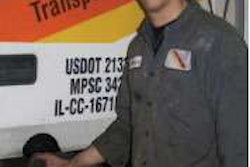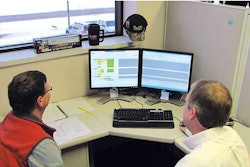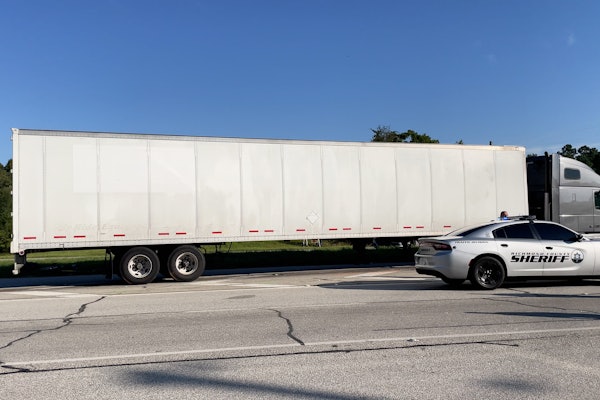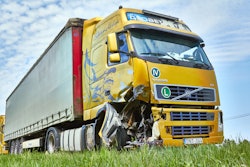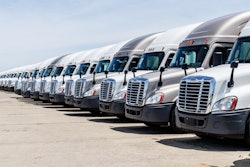Boyd Bros.
Clayton, Ala.
Riding the rails
Boyd Bros. sparks intermodal flatbed
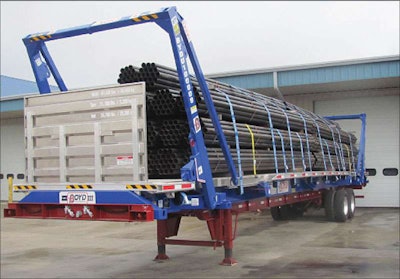 The Boyd Intermodal/Raildecks Intermodal flatbeds – which are being built by Fontaine Trailer – presently have a 44,200-pound capacity, with plans to reach 46,000 pounds as new lighter technologies come to market.
The Boyd Intermodal/Raildecks Intermodal flatbeds – which are being built by Fontaine Trailer – presently have a 44,200-pound capacity, with plans to reach 46,000 pounds as new lighter technologies come to market.Just because Boyd Bros. is based in a small town in southeast Alabama doesn’t mean the flatbed carrier doesn’t dare to think big. The Clayton-based company and its Tuscaloosa, Ala.-based subsidiary, WTI Transport, have 1,050 tractors and 1,670 48-foot flatbeds. Boyd Bros. has full-service terminals in Clayton, Cincinnati and Birmingham, Ala., as well as service centers in Greenville, Miss.; Cartersville, Ga.; and Cofield, N.C.
The company also has earned safety awards from the American Trucking Associations and has been recognized as one of the Truckload Carriers Association’s “Best Fleets To Drive For.” Such accolades from the industry and its own drivers are testimony that Boyd Bros. knows a little something about managing flatbed capacity, as well as its current and future industry state.
Increasing capacity in an era of ever-worsening driver shortages sparked by tightening regulations and increased safety scrutiny is difficult for any trucking company, but perhaps more so for flatbed carriers that up until now haven’t been able to utilize intermodal offerings as an option. Because railroads traditionally have not accepted flatbed trailer loads on the rail system, some of the heaviest bulk loads of steel and other metals have been required to travel over the highways, requiring more equipment and drivers while ramping up congestion and emissions in the process.
Meanwhile, under the Federal Motor Carrier Safety Administration’s Compliance Safety Accountability program, flatbed haulers say they have faced more Safety Measurement System scrutiny due mostly to the fact that their cargo is open for all to see, exposing fleets to possibly more frequent and stricter evaluations of cargo securement and other maintenance issues.
Finding a solution
That’s why a few years back, Boyd Bros. began looking for a system whereby it and other flatbed shippers could use the U.S. railway network for long-distance shipments. After years of development, the company’s Boyd Intermodal branch – in conjunction with its partner, Raildecks Intermodal – has launched the Boyd/Raildecks intermodal flatbed product designed to allow more industrial freight to be transported by railroad.
Boyd Bros. helped to develop an intermodal flatbed product to boost capacity by allowing industrial freight to be transported by railroad.
Raildecks had been searching for a customer to help it develop an intermodal product at about the same time that Boyd Bros. was looking for an intermodal solution.Railroad company BNSF – after hearing both Boyd Bros. and Raildecks tell similar stories from their own separate business perspectives – put the two companies together.
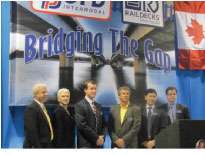 Boyd’s Richard Bailey, Gail Cooper, Chris Cooper and Steve Colley join Raildecks’ Rick Jocson and Murray Crane at a press event to launch the intermodal flatbed.
Boyd’s Richard Bailey, Gail Cooper, Chris Cooper and Steve Colley join Raildecks’ Rick Jocson and Murray Crane at a press event to launch the intermodal flatbed.For two years, Boyd Bros. and Raildecks worked with BNSF and Jasper, Ala.-based Fontaine Trailer to shape and tweak the intermodal double-stack flatbed for it to smoothly accommodate both highway and rail transport. After many prototypes were tested and 240 loads were shipped successfully during a pilot program, the product now is ready for wider use.
Class 1 railroads can enable the flatbed industry to create capacity “when the only way previously was to add a trailer and a driver,” said Chris Cooper, Boyd Bros. chief operating officer. “This has never been done before now.”
BNSF said Boyd Bros.’ innovation will have a positive impact on the intermodal landscape.
“We are pleased to have teamed with Boyd Bros. to help develop the Raildecks intermodal solution,” said Steve Branscum, BNSF group vice president of consumer products. “We thank them for their professionalism and commitment to making safety a top priority during the pilot program over the last two years. We look forward to working closely with all those involved in this project to introduce this new and innovative transportation solution to the market.”
Rick Jocson, Raildecks chief executive officer, said that while some European companies already are using a system that allows flatbed freight to be hauled via railroad, this is the first time a North American trucking company has stepped forward to help bring a likeminded product to the U.S. market.
“Raildecks was looking to partner with an innovative flatbed motor carrier that put safety first, and we found it with Boyd Bros.,” Jocson said. “Partnering with Boyd ensured that best industry practices would be followed. The vision of the leadership team, experience and professionalism was instrumental in bringing the Raildecks solution to market.”
Many benefits
The intermodal flatbeds – which are being built by Fontaine Trailer – presently have a 44,200-pound capacity, with plans to reach 46,000 pounds as new lighter technologies come to market, said Steve Colley, Boyd Bros. vice president of sales. Under their agreement, Boyd Bros. gets first use of any new technology developed by Raildecks before it’s released to a wider market.
“This is a game-changer for our industry.”
– Richard Bailey, Boyd Bros. president
The intermodal flatbed trailer can be transported over short distances via highway on a chassis. Once inside an intermodal yard, it can be lifted onto intermodal trains and double-stacked, if necessary, for longhaul transport to its destination, where it is drayed to its final consignee. Most of the current units will be hauled by lighter daycabs, Colley said.
Taking higher-risk cargo off interstates and putting it onto rail lessens the hauler’s liability exposure to possible accidents, the companies say, and by facilitating shorter local runs to railyards instead of making longhaul trips for final delivery, the service is more driver-friendly.
The companies also say that by placing the units into service, they are contributing to less traffic and stress on the interstate infrastructure, a smaller carbon footprint and less fatigue on drivers.
“With the development of this product, the flatbed transportation and logistics industry is reaching a milestone,” said Richard Bailey, Boyd Bros. president. “This new product provides a means of transporting flatbed products over intermodal rail routes nationwide, which until now wasn’t possible.”
Boyd Bros. initially is looking to have 60 double-stack units up and running within the next few months, and Raildecks hopes to have as many as 500 produced by the end of this year. Boyd Bros. sees other available options for the product, such as flatbed loads on barge or containership.
“We’re looking at this to take off a couple of years from now,” Bailey said. “This is a game-changer for our industry.”
CCJ Innovators profiles carriers and fleets that have found innovative ways to overcome trucking’s challenges. If you know a carrier that has displayed innovation, contact Jeff Crissey at [email protected] or 800-633-5953.



